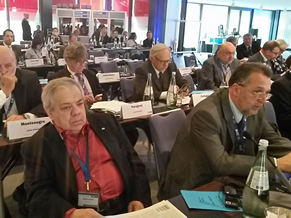|
Euroasian Jewish News
EAJC Representatives Take Part in WJC Governing Board Session in Berlin
22.09.2014 Representatives of the Euro-Asian Jewish Congress have taken part in the session of the World Jewish Congress (WJC) Governing Board, which took place in Berlin. The EAJC had been represented by Congress President Julius Meinl, Secretary General, WJC Vice President Michael Chlenov (Russia), General Council Chairman, WJC Vice President Josef Zisels (Ukraine), Director General Natalia Schmidt (Russia), EAJC Presidium member Alexander Baron (Kazakhstan), and General Council members, WJC Vice Presidents Guram Batiashvili (Georgia), Vladimir Kritzman (Kirgizia), and EAJC General Council member Jasa Alfandari (Montenegro).
 The WJC Governing Board gathers annually and is the highest decision-making body between the General Assembly sessions. This session of the Board had been chairmed by David de Rothschild (France). The participants of the Berlin session were greeted by Vice Chancellor of German Sigmar Gabriel and Minister of Foreign Affairs Frank-Walter Steinmeier, who assured the Jewish leaders of Germany’s adherence to the prosperity of Israel and the Jewish people.
Julius Meinl led a special section devoted to the life of Jewish communities. Michael Chlenov and Josef Zisels presented reports about Jewish life in Russia and Ukraine (Mr. Zisels’ text can be read here). Michael Chlenov stressed the main differerences between the situation of Jews in Western Europe and the former USSR. The EAJC Secretary General stressed that the situation with anti-Semitism is both qualitatively and quantatively different than the situation in Western Europe. According to Michael Chlenov, the sides of the conflict in the South-East of Ukraine have been “defending” Jews from impending anti-Semitism with the goal of furthering their propaganda. In the countries of the former Soviet Union, anti-Semitism is largely latent, while in Western Europe the so-called “new anti-Semitism” has been growing stronger becauase of anti-Israeli tendencies and Islamist radicalism. According to the EAJC Secretary General, unlike part of the Jewish establishment of Western countries, most Jewish communities of the former USSR remain in a position of “positive neutrality” where it conerns the situation in Ukraine.
The resolutions discussed at the session included a call for the government, publishers and book sellers of Germany “to take the necessary measures to prevent any further publications and the selling of Mein Kampf in book stores, taking into account the special responsibility of Germany to victims of Nazi crimes.” This is necessary to clearly show “that books inciting hatred towards the Jews must not be legally sold in Germany.”
The participants of the meeting criticized the United Nations for certain “UN agencies and senior officials” taking a one-sided anti-Israeli stance in the newly-aggravated Palestinian-Israeli conflict, and have made unfounded accusations of the Israeli government ordering intentional attacks on the civilian population. The WJC called for Israel and the Palestinians to return to “direct peace talks.”
In the resolution on anti-Semitism in Europe, the delegates called for a more effective implementation of hate crime laws and lamented that “many European countries do not fulfill their international obligations in combating anti-Semitism” and that “many anti-Semitic acts are not classified as such.” The WJC called for “all countries to accept the definition of anti-Semitic crimes based on the working definition of anti-Semitism developed by the former Observer Committee of the European Union and is in use by the law enforcement bodies of a number of countries.”
Other resolutions concerned art objects stolen by Nazis and the upcoming 70th anniversary of the liberation of a number of Nazi death camps, including Auschwitz.
|
|
